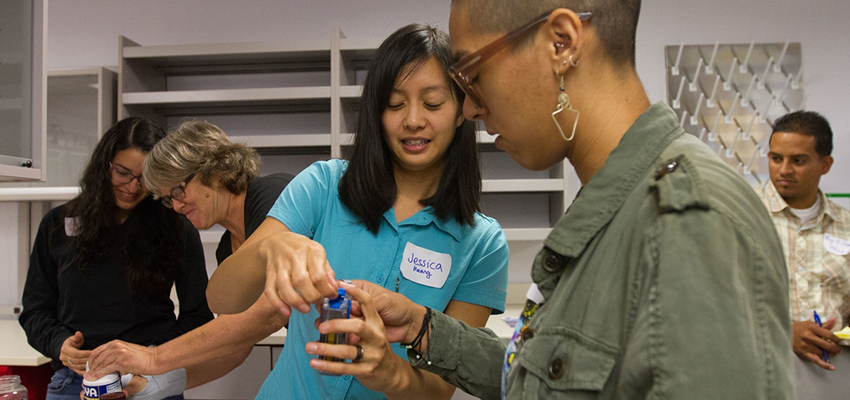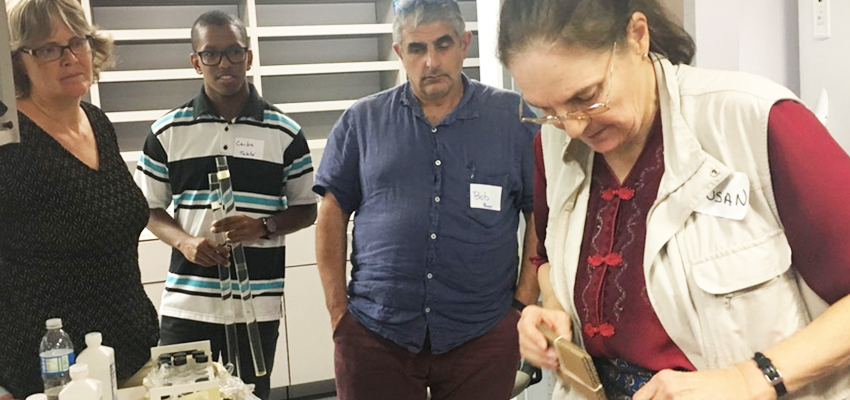
“That was an amazing experience. I learned how to make a sand water filter system to remove particulates. I learned how to make my own solar disinfection bag. I learned how to make a rocket stove – all with homemade materials.”
- Luis E. Rodriguez Reyes, epidemiology student, following the San Juan, Puerto Rico workshop
The impact of Hurricane Maria on availability of potable water
After Hurricane Maria slammed into Puerto Rico in September 2017, dead animals, structural damage in pipes, and treatment plant failures compromised the quality of many local water sources, sparking concern about waterborne diseases such as Leptospirosis, which is potentially fatal. The massive, long-term failure of the electrical grid meant that water and chlorination systems powered by electricity were not functional in many communities around the island months after the hurricane.
This left hundreds of thousands of people with no access to running water, forcing them to collect it from streams or springs. Reports of gastrointestinal disease surged all over the island. Even when piped water was restored to communities, intermittent and frequent power outages seriously compromised the safety of people’s water. Puerto Rico’s 3.4 million people are widely dispersed across the mountainous island, which further delayed restoration of electricity. As weeks passed, it became clear that people in rural areas badly needed easily accessible, locally available means to collect, test, and purify water in the face of long-term infrastructure failure.
MIT D-Lab Collaborators & Workshops
Oxfam and the Puerto Rico Science, Technology & Research Trust, in collaboration with University of Puerto Rico (UPR), invited MIT D-Lab to lead a hands-on technical training of trainers workshop on water treatment and testing in San Juan in November 2017 for community leaders, university students, and relief workers providing aid on the island.
The team from MIT D-Lab included Founding Director Amy Smith, Lecturer Susan Murcott, and former staff member and current PhD candidate at Harvard School of Public Health Jessica Huang. The team was joined by former D-Lab student Pam Silva who is from Puerto Rico and lives there. Participants learned to use easy-to-source local materials for a host of simple practical techniques for testing the quality of water and ensuring that it is potable.
The three-day workshop covered:
- Making water filters with sand, gravel, and an empty two-liter plastic soda bottle.
- Building stoves using several different sizes of metal cans, sand, and wood for fuel to boil water and cook simple food.
- Chlorine production that uses electrolysis of a salt water to produce a solution to disinfect water.
- Designing and constructing solar water disinfection bags.
- Learning to use body heat to perform water tests with a simple waist-belt incubator and get results faster than sending samples away and waiting for results from a centralized testing lab.
The 36 participants in the workshop then used these techniques in their work to train their colleagues so they in turn could teach people in communities where they worked how to make these simple technologies and tools to help guarantee safe drinking water, freeing them from dependence on intermittent handouts of bottled water.
In March, a subset of the team returned to Puerto Rico to offer a hands-on, 4-day workshop to train three NGOs to do more extensive local water testing in rural communities with long term water safety problems. The D-Lab team and the partners went to three different areas of the island to demonstrate and perform tests for water quality at the community level using a low-cost water testing kits that are not dependent on electricity. The three NGOs were all committed to training community leaders and health workers to carry out this water testing on a regular basis until the water systems are restored and chlorination is reliable. This training equipped these organizations and their partner communities with water quality testing skills, tools, and resources in preparation for future emergencies. For more information please see this video on the training.


